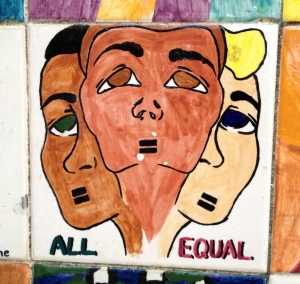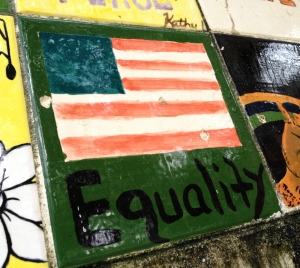A follower of my blog went to the ‘Suggest A Topic’ section of my website and posed this question: “As a program manager, and/or supervisor – how does one promote and enforce cultural humility and an inclusive workplace?”
This is a great question, and I appreciate the opportunity to address it. It’s also a very BIG question—articles, chapters, and books have been written about both cultural humility and inclusivity in the workplace. Given time constraints, I’ve taken the liberty of rewriting the question and dividing it into two more easily digestible posts, the second of which will appear next week.
Although I’d intuited what cultural humility might mean, in all honesty I hadn’t heard the term until this question was put to me. This despite the fact that I went to a really good grad school. Was I absent that day? Was there an elective I didn’t elect? Where was this crucial concept hiding, in the course curriculum? While perplexed and slightly troubled that cultural humility hadn’t found its way into my social work lexicon, I assume I’m not alone. So before delving into ways a supervisor or manager might promote cultural humility in the workplace, I’ll first explore what it is.
What is “cultural humility” (and what does it have to do with “cultural competence”)?
To practice cultural humility is to maintain a willingness to suspend what you know, or what you think you know, about a person based on generalizations about their culture. Rather, what you learn about your clients’ culture stems from being open to what they themselves have determined is their personal expression of their heritage and culture, what I call their personal culture.
In a compelling YouTube video by Director Vivian Chavez, Melanie Tervalon, a physician and consultant, and Jann Murray-Garcia, a nursing professor at UC Davis, thoughtfully discuss the philosophy and function of cultural humility. Here’s the URL:
They describe cultural humility as having ‘three dimensions.’
1) Lifelong learning & critical self-reflection — to practice cultural humility is to understand that culture is, first and foremost, an expression of self and that the process of learning about each individuals’ culture is a lifelong endeavor, because no two individuals are the same; each individual is a complicated, multi-dimensional human being who can rightfully proclaim “My identity is rooted in my history… and I get to say who I am.”
2) Recognizing and challenging power imbalances for respectful partnerships — while working to establish and maintain respect is essential in all healthy and productive relationships, the root of effective social work practice is in acknowledging and challenging the power imbalances inherent in our practitioner/client dynamics.
3) Institutional accountability — organizations need to model these principles as well (from micro, to mezzo and macro practice)
This model incorporates and expands upon what some adherents view as the limitations of “cultural competence.” Here is an excerpted passage from the video that illustrates a consequence derived from a reliance on cultural competence without cultural humility.
“An African American nurse is caring for a middle-aged Latino woman several hours after she’d had surgery. A Latino physician, on a consult service, approached the bedside and, noting the moaning patient, commented to the nurse that the patient seemed to be in a great deal of post-operative pain. The nurse summarily dismissed his perception, informing him that she took a course in nursing school in cross-cultural medicine, and knew that Hispanic patients over-express the pain that they are feeling. The Latino physician had a difficult time influencing the perspective of this nurse, who focused on her self-proclaimed cultural expertise.”
The video goes on to point out that the Latino doctor might have been a resource for the nurse, but because of the nurse’s self-perception of cultural competence she did not grasp the opportunity to learn that was right in front of her. She was not seeing her patient as a unique individual, but as a “Hispanic patient.” Confident in her cultural competency training the nurse believed she knew all that she needed to know in order to make a critical call about the patient’s well being in that moment. Sadly, this is not an uncommon belief.
Tervalon and Murray-Garcia cite an assumption among some who view their practice as culturally competent that they’ve “got it down”—that among providers, they are the expert and they know better than the consumer what the consumers’ experience is and needs are. Nothing could be more arrogant or further from the truth. Our clients are the experts on their lives, not their service providers. This personal belief, which in practice I have held inviolable, is the single thing that had me realize that although I’d not heard the phrase cultural humility I was, in fact, practicing it. Imperfectly, to be sure, but like I said—it’s a lifelong endeavor, the central tenet of which is a respect for the unique cultural experience of the individual and a commitment to learning that knows no end.
Cultural competence is a helpful starting point in the development of a caring, compassionate, and effective practice, but in light of a deepening understanding of cultural humility its limitations are revealed. In the example of the Latina patient, what the nurse claims was “true” for Hispanics was not true for her. If she’d had the opportunity to develop an understanding of the philosophy and practice of cultural humility it is likely she would have recognized what the Latino doctor suggested to her as an opportunity to learn. As a result, she might not have been so quick to dismiss her patient’s pain.
NEXT WEEK: Cultural Humility, Part II – Promoting Cultural Humility In the Workplace
Questions for Further Consideration
1) What is the relationship between the practice of cultural humility and expressions of cultural pride?
2) What experiences and qualities comprise your “personal culture?”
Additional Information On Cultural Humility
Cultural Humility Versus Cultural Competence: A Critical Distinction in Defining Physician Training Outcomes in Multicultural Education, Journal of Health Care for the Poor and Underserved (May 1998)
http://muse.jhu.edu/journals/hpu/summary/v009/9.2.tervalon.html
Foundations For Community Health Workers, Berthold, Miller, Avila-Esparza (2009)




Pingback: Gifts from Ngā Tāngata Moemoea – Nau mai
Dear “Gifts…”,
I absolutely love it, too! What a richer experience of not only our uniqueness, but of those qualities that connect us, when we allow ourselves to honor and explore the personal culture we cultivate, each and every one of us, throughout our lives. Wonderful!
Your research certainly has aroused my curiosity—congratulations on this meaningful pursuit, and thank you for taking the time to read and comment.
Best wishes,
Craig
LikeLike
Love this post!! Thank you for the video. I always struggled with “cultural competence” lessons in school. How can I ever be “competent” in a culture that is not my own? I’m glad this concept has evolved.
LikeLike
Very late to the post, but some interesting writing about “personal culture” is the book “Far from the tree” by Andrew Solomon
LikeLike
And even later to the reply, Jen. Forgive me! I have been a fan of Mr. Solomon’s since I first came across him on TED. Thanks for the recommendation—I will check it out.
Best wishes,
Craig
LikeLike
Great post Craig. Invaluable points. Without a doubt generalization has the power to reduce the quality of the service and leaving the needs of clients unmet. Thanks for that!!!!
LikeLike
Dear Glorious,
I thank you for having read this post, and am glad you’ve gotten something from it. For technical reasons beyond my ability to understand, much less explain, I have only now been able to reply—please forgive me. Sadly, this has occurred with a number of comments, not only with yours.
Generalizing, stereotyping, is something many of us do, and have been subject to. This is not by way of excuse, but I’d like to think that in the majority of cases there is no malice involved, and I know you are not suggesting that there is. So much of what we do, personally and professionally, is done for the sake of expediency, of course, which has a certain useful aspect to it, but at a cost. One of those costs substantiates your point—making generalizations about the history or experience of our clients can unquestionably reduce the quality of service delivery, leaving critical service needs unmet. This is not only a question of education, understanding, and practice, unfortunately. It is also a consequence of usually overburdened front-line staff, the most talented of whom are managing more than can be reasonably expected of them.
Deep breath time! Cultural humility is a practice, and to my astonishment I still rarely hear it referred to in human and social services circles. As such, I am all the more appreciative of the time you took to read my articles, and join the conversation.
All the best to you and yours,
Craig
LikeLike
Thanks for this post! I like the notion of a personal culture. I know much of my personal culture is comprised of what I’ve learned growing up the way I did. I think it is why I came into social work in the first place because I value social justice and humility, especially when working with people who are so deeply marginalized in our society.
I don’t think you’re the only social worker who missed this piece in our education. I think schools have gotten much better but I know it is a hard subject to take from the classroom and out to the world. Cultural humility means we have to change our own selves, and change is hard. I think personal experience with other cultures helps us recognize our own ignorance, and I’m not sure that piece will ever be able to be taught. It’s like teaching the naive to be savvy, it’s complex and doesn’t take place in a sterile environment like a classroom. For me that’s the difference between competence and humility. Cultural competence means we’ve been educated about other cultures, humility is how we should be practicing that competence in the field.
LikeLike
Hi Sarah (RootedInBeing),
Thanks for posting your question in ‘Suggest A Topic.’ As was my hope, it provoked me into learning something new about myself and my practice.
I, too, like the notion of a ‘personal culture.’ It almost seems… obvious, doesn’t it? And it makes me curious about where this concept, or something akin to it, exists in the literature. It seems so obvious, in fact, that I’m convinced it must exist somewhere. Does it go by a different name? I will develop this further and share as I go.
I very much agree with your take on this and appreciate your elegant framing of the relationship between cultural competence and cultural humility. It is worth repeating. “Cultural competence means we’ve been educated about other cultures, humility is how we should be practicing that competence in the field.”
Brava!
Your fan,
Craig
LikeLike